|
|
|
Sort Order |
|
|
|
Items / Page
|
|
|
|
|
|
|
| Srl | Item |
| 1 |
ID:
181227
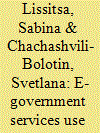

|
|
|
|
|
| Summary/Abstract |
Using data from Annual Social Surveys of the Central Bureau of Statistics, this article focuses on patterns of digital inequality among Israeli single mothers in 2014–19. Only half of single mothers in Israel used e-government services. A higher percentage of e-government use was found among high socioeconomic status (SES) single mothers, compared to their counterparts from low SES. Both groups preserve their pace of e-government adoption; so if the effective intervention strategies won’t be applied, the between-groups gaps will exist in the near future. In the context of digital inequality policy makers should address single mothers according to their social class.
|
|
|
|
|
|
|
|
|
|
|
|
|
|
|
|
| 2 |
ID:
108332


|
|
|
| 3 |
ID:
073440
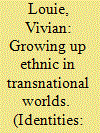

|
|
|
|
|
| Publication |
2006.
|
| Summary/Abstract |
Transnationalism refers to the phenomenon of immigrants maintaining connections to their country of origin and using a dual frame of reference to evaluate their experiences and outcomes in the country in which they have settled. How does transnationalism matter in the identities among the second generation? This article argues that growing up with parents who want children to participate in their homeland imaginary and in a strong transnational social field does not necessarily mean second-generation Dominicans and Chinese will themselves adopt transnational orientations and/or practices. I find that my Chinese respondents, because of authoritarian parent-child relationships, relative loss of the ethnic language, and scarcity of contact with their parents' countries of origin, viewed themselves as mainly ethnic subjects. Identities for my Chinese respondents involved a generational- and class-specific ethnic identity grounded in the enclaves and perceived rarefaction vis-à-vis mainstream America. My Dominican respondents, because of greater communication within the family, ethnic language maintenance, and the very frequent number of trips they made to the Dominican Republic, drew from both transnational and ethnic orientations, meaning they situated who they were within both national contexts. Although my Dominican respondents acknowledged the differences between Dominicans "back there" and themselves, they spoke cogently on class, gender, and the color line there as well as here. At the same time, their identities were informed by their pan-ethnicity in the United States, namely, how Latinos and Dominicans, in particular, are perceived.
|
|
|
|
|
|
|
|
|
|
|
|
|
|
|
|
| 4 |
ID:
167393


|
|
|
|
|
| Summary/Abstract |
A significant number of studies indicate that economic prosperity promotes higher values such as democracy, equality and freedom of choice. Pakistan has witnessed a considerable increase in the size of the middle class contributing to the increased participation of women in the labour force. This increase may translate into higher values among working women across income classes. This article draws on structured interviews (n = 350) with working women in the metropolis Lahore to investigate the extent their socioeconomic status is linked with self-expressive values. By using the ordinal logit model, this paper observes that significant differences exist in women’s perceptions and values across income and education groups. This study confirms that women with higher income and education levels are more independent in their choices. They exercise more authority in their personal and public life. Results also confirm their considerable interest in the democratization process and diminishing involvement in religious practices relative to middle- and lower-income and education groups.
|
|
|
|
|
|
|
|
|
|
|
|
|
|
|
|
| 5 |
ID:
165003


|
|
|
|
|
| Publication |
New Delhi, Cambridge University Press, 2019.
|
| Description |
x, 275p.hbk
|
| Standard Number |
9781108486552
|
|
|
|
|
|
|
|
|
|
|
|
Copies: C:1/I:0,R:0,Q:0
Circulation
| Accession# | Call# | Current Location | Status | Policy | Location |
| 059624 | 320.95491/MCC 059624 | Main | On Shelf | General | |
|
|
|
|
| 6 |
ID:
151662
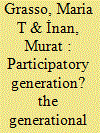

|
|
|
|
|
| Summary/Abstract |
This research aims to understand the extent to which generation and social class determine Turkish respondents’ level of political activism. It tests both the macroeconomic socialization effect and the social class effect on political activism as hypothesized by Inglehart and Lipset, respectively. It also strives to understand whether a macropolitical period effect may also some generational implications for political activism. Beyond these examinations, it also raises a challenge to Lipset’s working-class authoritarianism thesis – within the particular area of political activism – for those generations which came of age under an authoritarian politico-juridical order as well as for those which did not.
|
|
|
|
|
|
|
|
|
|
|
|
|
|
|
|
| 7 |
ID:
147879


|
|
|
|
|
| Summary/Abstract |
This paper investigates the role played by education as a mediator of inter-generational social mobility in India. It uses a nationally representative data set (the National Election Study 2009) to describe and establish patterns of social mobility in India, and subsequently, to establish the role played by education with regard to this mobility. In particular, it attempts to test the ‘merit’ argument by analysing whether the effect of social origins (class and caste; along with locality and gender) on mobility and on gaining access to one class destination (where education is expected to be critical) has declined, and whether education plays a role. However, while the paper finds high rates of inter-generational stability, rural–urban disaggregation complicates the broader picture. The role of education is also key, especially for women. The paper finds that education plays an important role with regard to social mobility chances, but the effect of caste and class of origin remains significant. Focusing on one class destination – the professional class – once we control for education, the impact of caste seems to vary, while the role played by class of origin remains statistically significant. The implications of these patterns by gender and locality are discussed.
|
|
|
|
|
|
|
|
|
|
|
|
|
|
|
|
| 8 |
ID:
174008
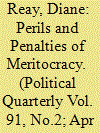

|
|
|
|
|
| Summary/Abstract |
This article deploys insights from Michael Young’s 1958 satire The Rise of the Meritocracy to challenge the dominant ideology of meritocracy in contemporary British society. It draws on ethnographic research in schools over a twenty‐five year period to illustrate the damage the illusion of meritocracy inflicts on children and young people, but particularly those from working class backgrounds. It argues that the consequences of the pretence of meritocracy are to be found in everyday practices of testing, hyper‐competition and setting, and beyond the classroom in the designation of predominantly working class schools as ‘rubbish schools for rubbish learners’. It concludes that, beyond the negative consequences for working class learners, there are wider consequences for British society, exacerbating social divisions and encouraging the growth of distrust, prejudice, envy, resentment, and contempt between different social groups.
|
|
|
|
|
|
|
|
|
|
|
|
|
|
|
|
| 9 |
ID:
123272
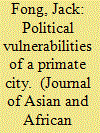

|
|
|
|
|
| Publication |
2013.
|
| Summary/Abstract |
Dynamics of the May 2010 'Red Shirts' uprising in Bangkok are examined through literature about the primate city, a city that is exponentially larger than a country's other cities. Employing news coverage of events, history about Bangkok's urban and political development, and analyses of class-based inequalities and nationalisms that the city harbors within its confines, attributes of primate city are expanded to include its perennially vulnerable political status. Such a rendering of the politically vulnerable primate city is employed to theorize how the primate city - when functioning as a national capital - is more than a large urban center, but one that collects much of the nation's hopes, dreams, and political struggles.
|
|
|
|
|
|
|
|
|
|
|
|
|
|
|
|
| 10 |
ID:
190116
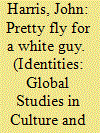

|
|
|
|
|
| Summary/Abstract |
In 2008 Joe Calzaghe (from Wales) fought Bernard Hopkins (from the USA) in a light-heavyweight boxing match. Prior to the fight Hopkins had taunted Calzaghe with the refrain that he would never lose to a white boy. This paper assesses the interplay of discourses surrounding race and nation in the build-up to the contest between the two boxers. The analysis highlights how simplistic binaries are used to perpetuate notions of difference and considers how this accentuates divides in contested racial and national terrains.
|
|
|
|
|
|
|
|
|
|
|
|
|
|
|
|
| 11 |
ID:
171716


|
|
|
|
|
| Summary/Abstract |
For national publics, terrorism is today one of the key policy challenges facing European governments. Yet little is known about whether and how the objective national economic, societal and political context influences public opinion about terrorism. The present article addresses this gap in the current research. Using Eurobarometer data, it is demonstrated that excluding a nation’s level of terrorism, no other objective national economic, societal or political indicator sways public attitudes towards terrorism. Objective national economic, societal and political factors are also found not to impact on the relationship between citizens’ economic conditions and public attitudes towards the same. Our results finally demonstrate that people’s perceived economic, cultural and physical (safety) insecurities tend to be a stronger predictor of these attitudes than the objective national context or (social) class differences. The article then discusses the implications of these findings.
|
|
|
|
|
|
|
|
|
|
|
|
|
|
|
|
| 12 |
ID:
185550
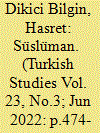

|
|
|
|
|
| Summary/Abstract |
This article argues that class divisions within Islamist community are an emerging aspect of contemporary Turkish politics. Nearly two decades of rule by an Islamist party enabled the Islamic capital to become a distinct capital fraction without improving the living conditions of the devout masses substantially. This fault line appears in the increasingly discernible criticism of the everyday lifestyles of rich Muslim women from within. Controversy over the extravagance of veiled women appears as a proxy class struggle between the new Islamic middle class and the devout poor, as well as the continued polarization between the Islamists and the secularists.
|
|
|
|
|
|
|
|
|
|
|
|
|
|
|
|
| 13 |
ID:
155403
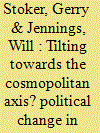

|
|
|
|
|
| Summary/Abstract |
The general election of June 2017 revealed a continued tilting of the political axis in England that has been long in the making. This was not a Brexit ‘realignment’—in that the vote is better seen as a symptom of a longer-term divide that is emerging between citizens residing in locations strongly connected to global growth and those who are not. In this analysis, we explore constituency-level patterns of voting in England between 2005 and 2017. Over this period, Labour's vote share has tended to rise in urban areas (that is, major cities), with younger and more diverse and more educated populations often working in ‘cosmopolitan’ industries, whereas the Conservative vote has tended to increase in less densely populated towns and rural areas, with older and less diverse populations. Significantly, Labour has also increased its vote in constituencies with a higher share of ‘precariat’ and emerging service workers—somewhat at odds with characterisation of a party that has lost the ‘left behind’. To the extent that changes in electoral support for the Conservatives and Labour are linked to the Brexit vote, the relationship far predates the referendum vote and should be expected to continue to reshape British politics in future.
|
|
|
|
|
|
|
|
|
|
|
|
|
|
|
|
| 14 |
ID:
107200


|
|
|
|
|
| Publication |
2011.
|
| Summary/Abstract |
Britain's constitution has changed dramatically over the past forty years in which the author has been involved in national politics: devolution, the supremacy of EU law, the greater willingness of the judiciary to intervene in political issues and new human rights legislation. However these changes have been essentially random, argues David Lipsey, lacking any binding theme. These changes continue under the new coalition government. However the even greater changes to British politics have essentially a single source: the dramatic change in social class in Britain and its impact on electoral politics-for example the rise of the media and the decline of ideology
|
|
|
|
|
|
|
|
|
|
|
|
|
|
|
|
| 15 |
ID:
109154


|
|
|
|
|
| Publication |
2011.
|
| Summary/Abstract |
During the past thirty years in the social sciences, there has been a wide-ranging discussion of "class politics" in capitalist modernity. Several distinct threads have developed, largely in isolation from each other. The authors suggest that the various accounts implicitly rely on different definitions of class politics and propose a way to classify them. The classification is based on two questions: first, whether changes in the strength of the left depend on the working class specifically or on cross-class dynamics and, second, whether emergent class differences in politics are largely spontaneous or constructed. The authors use this classification to assess the prospects for testing the empirical implications of different accounts and point to the more general insights potentially offered by each approach.
|
|
|
|
|
|
|
|
|
|
|
|
|
|
|
|
| 16 |
ID:
170675


|
|
|
|
|
| Summary/Abstract |
This article examines the intersections of fitness, consumption, the middle class and the female body in contemporary India. Having grown up exposed to and interacting with global markets, brands and commodities, young middle-class Indian women seek to engage in cultural practices that distinguish them as members of an upwardly mobile class of urban professionals. For many young women, working out at a gym or fitness centre has become an important performative act that signifies ability to successfully navigate the globalised and cosmopolitan worlds. Drawing mainly from ethnographic fieldwork, the article suggests that the fit, young, middle-class body has become the ‘right’ female body in contemporary India and functions to reinforce a privileged social location. It underpins moralities of self-care and marks the rise of the global Indian woman prepared to tackle multiple roles and responsibilities.
|
|
|
|
|
|
|
|
|
|
|
|
|
|
|
|
|
|
|
|
|